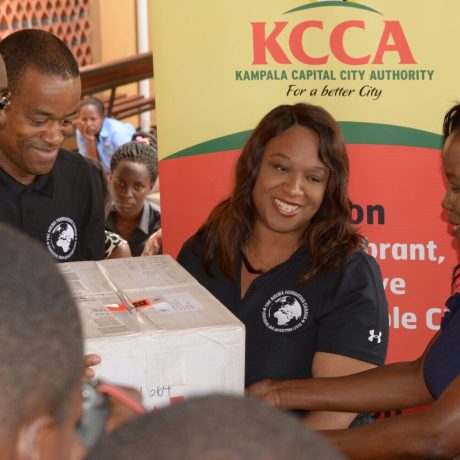The Rhema Foundation Canada

Kampala Here We Come: The Final Days
This past July, the Rhema Foundation Canada team embarked on a medical humanitarian trip to Kampala, Uganda that opened their eyes to the state of the country’s strained healthcare system. From the understaffed clinics, to the dilapidated schoolhouses, the team saw many opportunities for support and improvement. However, it was the final days of the trip that provided a more complete picture of how help from abroad could help to make a real difference in the lives of Ugandans.
 After meeting with locals from all walks of life – including those working in the healthcare field and those accessing medical services – the team came to a number of valuable conclusions about the state of healthcare in Kampala. On the one hand, the team noted the desperate need for better medical infrastructure. This includes everything from medicine and medical supplies, to improved technology and diagnostic tools. However, the team also noted the pressing need to improve awareness around issues of health and hygiene – issues that are highly intangible, but no less concerning.
After meeting with locals from all walks of life – including those working in the healthcare field and those accessing medical services – the team came to a number of valuable conclusions about the state of healthcare in Kampala. On the one hand, the team noted the desperate need for better medical infrastructure. This includes everything from medicine and medical supplies, to improved technology and diagnostic tools. However, the team also noted the pressing need to improve awareness around issues of health and hygiene – issues that are highly intangible, but no less concerning.
More specifically, the team noted that many of these pressing medical concerns were especially concerning for vulnerable populations such a young girls, pregnant women, and new mothers. With a severe lack of resources for obstetrics and gynecology, many women receive inadequate care both before and after giving birth. This same lack of consistent care was also woefully apparent for HIV/AIDS patients.
Of course, the healthcare is only one piece of the complex development puzzle. In particular, the team noted that many of these medical concerns spilled over into the local school system, thereby affecting the state of the country’s overall educational sector. Indeed, with many students suffering from untreated medical concerns, gaining a proper education is a nearly impossible task for even the most dedicated pupil. This is particularly true for young women, who must contend with the stigma and lack of resources available to meet their monthly menstrual needs. 
The final observation the team made was how the influx of refugees from neighboring states – nearly a million from South Sudan alone – have strained the country’s already weak healthcare system. Not only has the refugee crisis overburdened many hospitals and clinics, but it has also highlighted ongoing issues of corruption and structural barriers to change.
With these observations in mind, the team left Kampala with a number of next steps in mind for providing ongoing support and assistance to the capital city. First and foremost, the team will be reviewing the current needs in Kampala with the help of guidance resources provided by KCCA, such as the ‘Strategic Outlook for Education in the City, Strategic Areas of Focus.’ Furthermore, the team will also be determining specific areas of focus to ensure long-term, sustainable change in Kampala. Finally – and perhaps the biggest undertaking of them all – the team plans to initiate a ‘1 Million Pad’ campaign, which aims to raise 1 million pads through partnerships, fundraising events, and community outreach to contribute to the education and empowerment of young women.
While the goals may seem lofty, the Rhema Foundation Canada is committed to creating a brighter future for the people of Kampala. It is also clear that the team will need help in achieving its goals, meaning that every dollar or hour of volunteered time is key to supporting our efforts. If you are interested in providing support for our initiative – monetary or otherwise – please do not hesitate to contact us.
